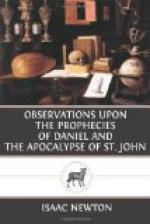This opinion is further supported by the allusions in the Apocalypse to the Temple and Altar, and holy City, as then standing; and to the Gentiles, who were soon after to tread under foot the holy City and outward Court. ’Tis confirmed also by the style of the Apocalypse itself, which is fuller of Hebraisms than his Gospel. For thence it may be gathered, that it was written when John was newly come out of Judea, where he had been used to the Syriac tongue; and that he did not write his Gospel, till by long converse with the Asiatick Greeks he had left off most of the Hebraisms. It is confirmed also by the many false Apocalypses, as those of Peter, Paul, Thomas, Stephen, Elias and Cerinthus, written in imitation of the true one. For as the many false Gospels, false Acts, and false Epistles were occasioned by true ones; and the writing many false Apocalypses, and ascribing them to Apostles and Prophets, argues that there was a true Apostolic one in great request with the first Christians: so this true one may well be suppos’d to have been written early, that there may be room in the Apostolic age for the writing of so many false ones afterwards, and fathering them upon Peter, Paul, Thomas and others, who were dead before John. Caius, who was contemporary with Tertullian, [7] tells us that Cerinthus wrote his Revelations as a great Apostle, and pretended the visions were shewn him by Angels, asserting a millennium of carnal pleasures at Jerusalem after the resurrection; so that his Apocalypse was plainly written in imitation of John’s: and yet he lived so early, that [8] he resisted the Apostles at Jerusalem in or before the first year of Claudius, that is, 26 years before the death of Nero, and [9] died before John.
These reasons may suffice for determining the time; and yet there is one more, which to considering men may seem a good reason, to others not. I’ll propound it, and leave it to every man’s judgment. The Apocalypse seems to be alluded to in the Epistles of Peter and that to the Hebrews and therefore to have been written before them. Such allusions in the Epistle to the Hebrews, I take to be the discourses concerning the High-Priest in the heavenly Tabernacle, who is both Priest and King, as was Melchisedec; and those concerning




